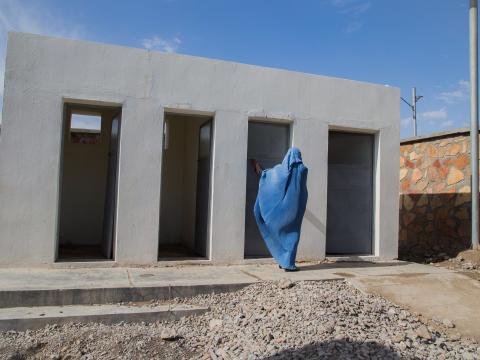
5 reasons toilets are no laughing matter
For World Toilet Day, Lindsay Lange looks at five reasons toilets (and access to sanitation) are foundational for health and development.
Despite the fact that defecation is a universal (and necessary) human experience, toilets are not something we like to think about. For many of us, they are only ever mentioned as part of a joke. But, for the 3.6 billion people who lack access to basic sanitation at home, not having a toilet is no laughing matter.
My third child is now a toddler and we are soon entering the potty-training days. I remember this from my previous children- the worry about whether he’s ready; wondering how long the process will take, and the stress of always needing to know where the nearest toilet is, in case he has an urgent need. But in the United States where we live, a safe and clean toilet is almost always readily available, whether my son is at home, at school or at the doctor’s office.
Many mothers around the world face the stress of raising children without a safe – or any – toilet at home. Instead, they must teach their children to defecate in the open or in a poorly constructed facility, knowing that doing so is exposing them to many risks.
A safe place to defecate is critical for these 5 reasons:

1) Toilets provide dignity, privacy and safety. Defecating in the open or having to travel a long distance to a toilet puts women and children at risk of sexual violence, harassment and abuse. A clean, private toilet offers a dignified and safe place to relieve oneself.

2) Toilets keep children healthy. Toilets prevent people from exposure to deadly germs that are transmitted through faeces. Poor sanitation puts children at risk of diarrhoeal disease, the second leading infectious cause of death in children, as well as chronic conditions like malnutrition and stunting.

3) Toilets keep children in school. Without proper toilets at school, the education of children suffers. Many girls drop out when they begin menstruating or stay home each month during their period, missing critical learning opportunities.

4) Toilets help families and communities thrive. Poor sanitation traps people in a cycle of poverty. When mothers have a safe toilet at home, they spend less time caring for sick children and have more time for economic activities. Indeed, every $1 invested in basic sanitation in rural areas returns more than $5 in increased productivity and saved medical costs.

5) Toilets protect the environment. Untreated human waste contaminates the environment, including important surface and groundwater resources. Groundwater is the primary source of drinking water for billions of people around the world, and inadequate sanitation systems put entire communities at risk.
This is why World Vision has scaled up our work in sanitation, focusing on both building the demand for sanitation services and ensuring a sustainable supply of affordable household sanitation products. At schools and healthcare facilities, we provide toilets that meet the specific needs of women and girls and are accessible for people with disabilities. All of this is implemented alongside contextualized behaviour change approaches so that toilets are used and maintained for the long-term. In 2021 alone, we provided 2.3 million people with access to improved household sanitation and constructed toilets at 904 schools and 478 healthcare facilities.
This World Toilet Day, we must remember the 3.6 billion people globally who do not have access to a proper toilet. For the mother struggling to find a safe place for her child to defecate, we must move past our discomfort about the topic and into action. Defecation is a universal need for all humans, and a safe, private and dignified place to defecate is a universal right.
Learn more about World Vision's Water, Sanitation and Hygiene programming here.
Lindsay Lange is World Vision's WASH Knowledge Management and Capability Advisor.

